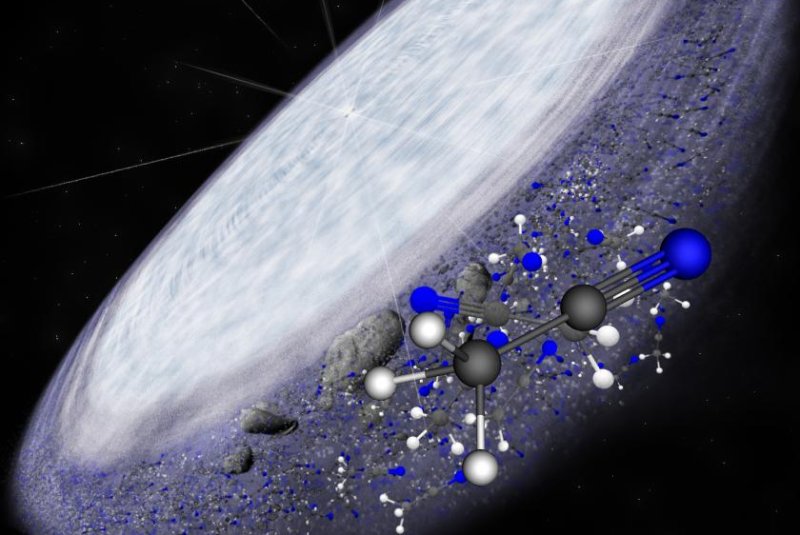An artistic rendering of faraway organic molecules. Photo by B. Saxton/NRAO/AUI/NSF
BOSTON, April 8 (UPI) -- Scientists still haven't been able to confirm alien life. But new research suggests complex organic molecules -- the type of volatiles that make life possible -- aren't unique to our solar system.
The report, published this week in the journal Nature, confirms the existence of complex, carbon-based molecules in the protoplanetary disk of an alien star system.
Using the telescope known as the Atacama Large Millimeter/submillimeter Array, or ALMA, scientists were able to make out the presence of methyl cyanide (CH3CN) in the dense disk of gas surrounding the million-year-old star MWC 480. Roughly double the size of the sun, the newly formed star is located in the Taurus star-forming region, 455 light-years away.
The new findings confirm what scientists have long suspected -- that dense circumstellar disks are rich in cyanide molecules. Cyanides, especially methyl cyanide, are essential for the kind of chemical environment that enables life, as their carbon-nitrogen bonds are an essential component of amino acids, the building block of proteins. Proteins are one the largest and most important types of biological molecules.
More than confirm the existence of cyanides outside the solar system, the research proves these complex carbon-based molecules can survive the volatility of a young star system.
Scientists believe comets on the outskirts of the early solar system delivered much of the organic matter and water that made life on Earth possible. But the new study suggests organic molecules may have been widely abundant.
"Studies of comets and asteroids show that the solar nebula that spawned our Sun and planets was rich in water and complex organic compounds," lead study author Karin Oberg, an astronomer with the Harvard-Smithsonian Center for Astrophysics, explained in a press release. "We now have evidence that this same chemistry exists elsewhere in the universe, in regions that could form solar systems not unlike our own."
"From the study of exoplanets, we know our solar system isn't unique in having rocky planets and an abundance of water," added Oberg. "Now we know we're not unique in organic chemistry. Once more, we have learned that we're not special. From a life in the universe point of view, this is great news."















